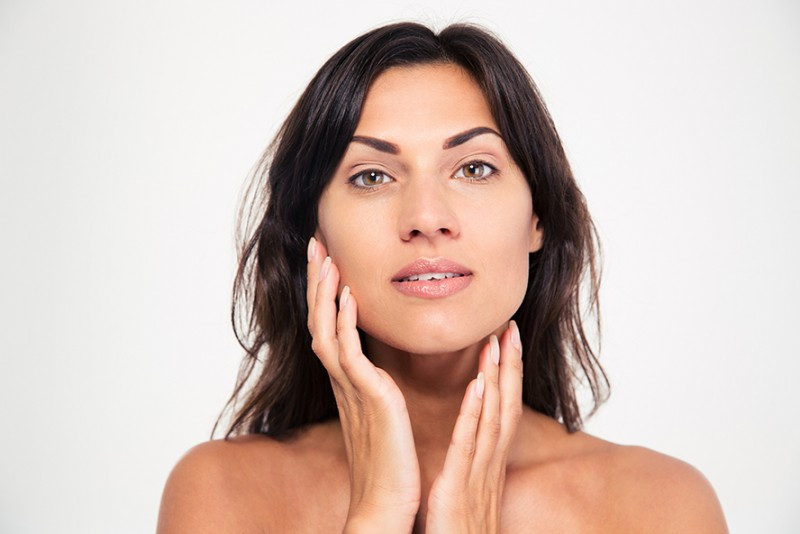One popular axiom of nutrition is that we are what we eat. That might not be truer than in how our food choices can determine the health and condition of our skin. What we include in our diets and therefore put into our mouths can play a direct role in maintaining healthy skin and steering us clear of problems such as dry skin, acne, wrinkles, sun damage, psoriasis and rosacea, among other conditions. What we eat, or what we leave out of our diet, can, over time, turn glowing, youthful-looking skin into something we want to hide from public view. That can be a real hindrance to enjoying our summertime months spent in the great outdoors, to include time on the beach. The good news is that simple changes to our diet can have a meaningful and relatively quick effect on skin appearance, for the better, in some cases producing results as effective as prescription medicines aimed at skin health and appearance. Face it (pun intended), our skin plays a vital role in how we look, and in turn in how we feel about ourselves. It's a premise that goes more than skin deep; skin health isn't only about outward appearance, it's also about the role it plays in providing a proper barrier, as healthyeating.sfgate.com puts it, between our surrounding environment and our internal organs – essentially, keeping pathogens and other toxins out. In that regard, poor nutrition can have a harmful effect on skin tissue.
Beware Nutrition Deficiencies
A well-balanced diet that avoids nutritional deficiencies goes a long way in keeping skin healthy. For example, a diet (to include use of supplements) consistently lacking in zinc can result in a zinc deficiency known to be associated with the development of abnormal skin pigmentation and skin lesions, even dermatitis. A selenium deficiency poses a higher risk of skin cancer and hair loss; it can also obstruct the manufacture of normal skin cells. By the way, snacking on nuts provides a good start in restocking your body with both zinc and selenium.Go for Antioxidants
When it comes to healthy eating, here is one you've probably heard plenty of times before: eat lots of fruits and vegetables, particularly those that are rich in antioxidants. They are good for your whole body, and that includes your skin. Antioxidants, per health.com, are effective at neutralizing free radicals that can cause wrinkles, brown spots and other unattractive signs of aging. Yes, we all age, but why speed along the signs of growing old when we have it within our power to stave off those signs? Note, too, the something as simple as drinking plenty of water each day goes a long way in keeping our skin hydrated. Here are some other tips on how good nutrition can lead to healthier skin:- Vitamin C can help improve skin health and promote faster healing to skin wounds, per chriskresser.com. Furthermore, it can help guard against the formation of wrinkles as well as act as an antioxidant that helps prevent damage from the sun's ultraviolet (UV) rays. Good sources of vitamin C include dark, leafy greens; broccoli; citrus fruits (such as oranges); and strawberries. Vitamin C supplements work well, too.
- Fat is good for the skin, to a degree. Our consumption of fat in the form of omega-6 (e.g. poultry, eggs and nuts) and omega-3 fatty acids (salmon, flaxseed and walnuts) help form waterproof barriers on our skin, per healthyeating.sfgate.com. This is not license to go out and pig out on fatty foods. Exercise caution against diets heavy in animal fat—it can spur an increase in the production of free radicals thought to interfere with normal cellular processing, aesthetic dermatologist Dr. Lisa Airan tells health.com.
- A Mediterranean diet, per health.com, that features fish, leafy greens, olive oil and fruit are believed to help protect the skin from melanoma. The olive oil as well as tomatoes and red wine can help curtail the chemical reactions that contribute to sun damage. A bonus is the Mediterranean diet's ability to promote weight loss. Tighten that belt while protecting your skin!
- Too much of a good thing can be harmful to the skin, too. Per the National Institutes of Health (NIH), an excess of various nutrients can also result in certain diseases. Carotenemia is caused by excessive intake of carotene-rich food such as oranges and carrots. What's carotenemia, you ask? It's a yellowing of the skin's pigmentation accompanied by increased beta-carotene levels in the blood.
- Speaking of NIH, it recommends a low-calorie, low-protein diet for sufferers of psoriasis.

